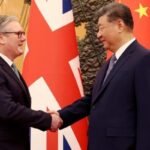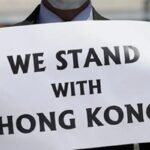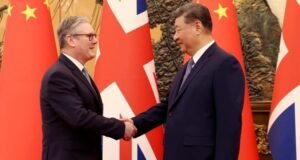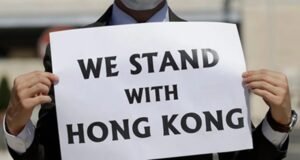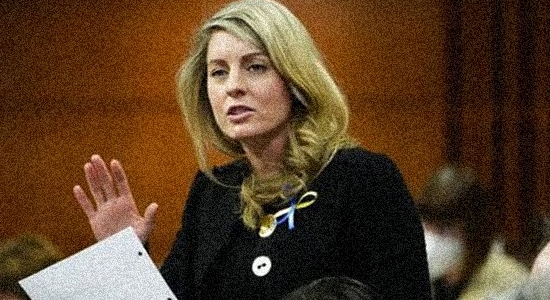
For several years, relations between Canada and China have been strained in part because China imprisoned a couple of Canadians, apparently at random, to retaliate against Canada for detaining a Huawei executive wanted by the United States. (The three men were released after the U.S. withdrew its extradition request.)
“China was also angered by revelations of its extensive influence operations in Canadian domestic affairs that led to a public inquiry into foreign interference,” reports The Globe and Mail (July 21, 2024).
Don’t criticize
But as the paper’s headline puts it, “China talks of mending fractured relations but says it won’t tolerate Canadian criticism of its human-rights record.” What Canada should do, then, is obvious. Don’t mend the fractured relations with China.
We’ve got Chinese Foreign Minister Wang Wi saying, first of all, that both China and Canada must consecrate themselves anew to a series of CCP-style banal generalities: “Both sides should return to their original aspirations, reflect on the past, grasp the right direction, draw lessons from history, earnestly abide by the commitments made in establishing diplomatic relations, and inject momentum into the restoration of normal relations between the two countries.”
Well, nobody should be grasping the wrong direction.
But Mr. Wang made clear to [Canadian Minister of Foreign Affairs Mélanie Joly (shown above)] that China will not tolerate criticism of Beijing’s record in Xinjiang, Hong Kong, Tibet or Taiwan. China has come under international opprobrium for its repression of Uyghurs in Xinjiang, its quashing of democracy and dissent in Hong Kong, its annexation and suppression of Tibet, and its increased menacing of the self-governed democracy of Taiwan.
Mr. Wang did not mention his country’s influence operations in Canada, including election interference, Chinese police stations and bullying of diaspora communities. But the statement said the foreign minister told Ms. Joly that China has a long-standing policy of “non-interference in internal affairs” of other countries.
A former Canadian ambassador to China, Guy Saint-Jacques, seems to grasp something about the right direction. He says that China’s view is that relations can be restored only “ ‘on our terms,’ ” namely that “no criticism will be allowed on what they consider their red lines. It puts the onus on us to agree, and I would say all of this is unacceptable to Canada. We have to agree to disagree.”
The Globe and Mail reports that in 2023, Joly kicked out the Chinese diplomat Zhao Wei “after The Globe reported Beijing had targeted Conservative foreign affairs critic Michael Chong and his relatives in Hong Kong in an attempt to gain leverage over the MP.”
Bedrock
According to the Canadian readout of the meeting between Joly and Wang in Beijing, “Minister Joly reiterated the importance of diplomatic relations that fully respect the Vienna conventions on consular and diplomatic relations, which codify the rules for the exchange, treatment, and behaviour of representatives abroad, and form the bedrock for the conduct of mutually respectful relations.”
The Canadian readout also said Ms. Joly reaffirmed Ottawa will continue to abide by the one-China policy. Under this country’s policy, the Canadian government does not recognize Taiwan as a sovereign state and does not maintain official, government-to-government relations with Taipei.
By warning Ottawa against talking about matters such as Taiwan, the Chinese government appears to be placing conditions on further development of the Canada-China relationship.
Vina Nadjibulla, vice-president of research and strategy at the Asia Pacific Foundation of Canada, said the language on Taiwan is concerning. She said any stabilization of the Canada-China relationship should not come at the expense of deepening relations with Taiwan. Canada last year signed an important investment deal with Taiwan to grant protection to business investors from each other’s country.
It seems like a mixed-bag of a meeting; not entirely bad. But the report does not indicate that Joly rejected Wang’s demand that the Canadian government avoid criticizing China (“Minister Joly’s visit reaffirms the Minister’s commitment to pragmatic engagement with China…,” says Canada’s readout). This and the willingness to keep appeasing China about Taiwan are not encouraging.
